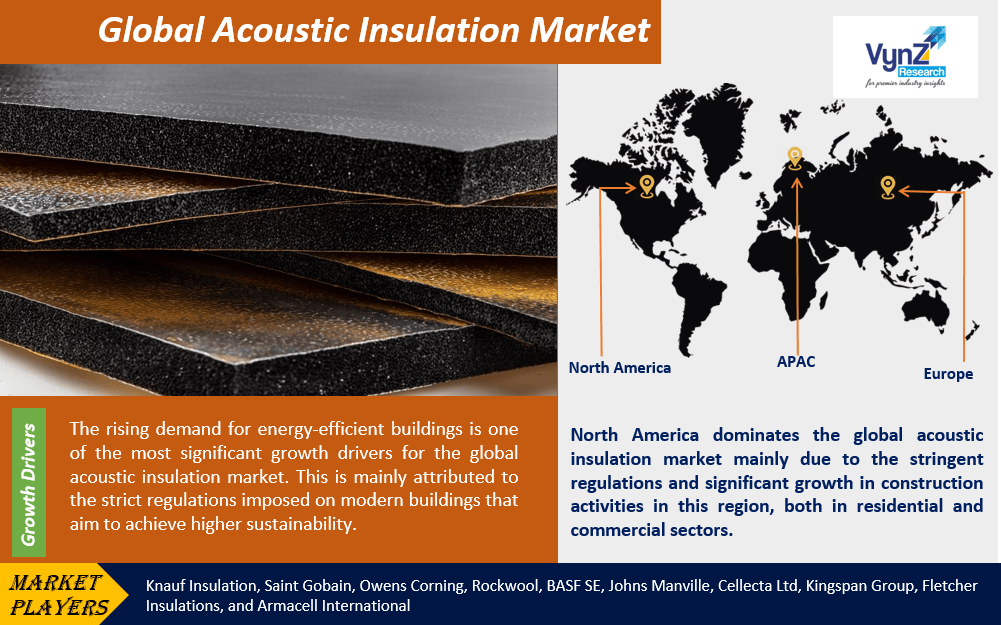| Status : Published | Published On : Oct, 2024 | Report Code : VRCH2109 | Industry : Chemicals & Materials | Available Format :

|
Page : 188 |

Global Acoustic Insulation Market Size & Share | Growth Forecast Report 2030
Industry Insights By Material Type (Fiberglass, Foam, Mineral Wool, Cellulose, and Others), By Application (Residential, Commercial, and Industrial Sectors), By End Users (Automotive, Construction, and Consumer Electronics Segments), By Product Type (Sound-Absorbing Panels, Batts, Rolls, and Sprays), By Installation Type (Professional Installation and DIY Solutions) and By Geography (North America, Europe, Asia Pacific and Middle East & Africa)
Industry Overview
The global Acoustic Insulation market size was valued at USD 15.2 billion in 2023. It is likely to grow up to USD 20.4 billion by 2030 at a CAGR of 4.60% during the forecast period ranging between 2025 and 2030. The growth of the market is mainly attributed to the growing adoption and widespread use of acoustic insulation in industrial and commercial spaces such as factories, manufacturing plants, open-plan office environments and more. It is mainly used either to protect workers from hearing damage, comply with occupational safety regulations, or create quieter working environments in the office. Overall, it improves employee focus and productivity.

Acoustic insulation refers to the technology and materials that are designed specially to prevent or reduce sound transmission within a confined space. It typically absorbs sound waves and dampens them to minimize noise pollution. The technology behind it is the material such as foam, fiberglass, mineral wool, and acoustic panels. These trap sound vibrations and reduce reverberations. It improves privacy, comfort, and productivity, and also produces better sound in studios and theaters. Acoustic insulation is primarily used in commercial buildings, industrial spaces, residential homes, recording studios, and even transport vehicles to prevent constant noise disturbances.
Global Acoustic Insulation Market Report Coverage
|
Report Metric |
Details |
|
Historical Period |
2018 - 2023 |
|
Base Year Considered |
2024 |
|
Forecast Period |
2025 - 2030 |
|
Market Size in 2024 |
U.S.D. 15.2 Billion |
|
Revenue Forecast in 2030 |
U.S.D. 20.4 Billion |
|
Growth Rate |
4.60% |
|
Segments Covered in the Report |
By Material Type, By Application, By End-User, By Product Type and By Installation Type |
|
Report Scope |
Market Trends, Drivers, and Restraints; Revenue Estimation and Forecast; Segmentation Analysis; Impact of COVID-19; Companies’ Strategic Developments; Market Share Analysis of Key Players; Company Profiling |
|
Regions Covered in the Report |
North America, Europe, Asia Pacific and Middle East & Africa |
Global Acoustic Insulation Industry Dynamics
Global Acoustic Insulation Market Trends/ Growth Drivers:
Growing demand for energy efficiency in buildings
The rising demand for energy-efficient buildings is one of the most significant growth drivers for the global acoustic insulation market. This is mainly attributed to the strict regulations imposed on modern buildings that aim to achieve higher sustainability. Acoustic insulation provides both soundproofing and thermal insulation, thereby reducing energy consumption in heating and cooling systems as well.Rapid urbanization and infrastructure development are also boosting its adoption and market growth to reduce noise pollution due to traffic, construction, and industrial activities. The rising awareness of the negative health effects of noise pollution and the urge for well-being also pushes the demand and the market forward since long exposure to high noise levels can lead to sleep disorders, stress, and other health issues.
Technological innovation and developments in materials and manufacturing techniques have improved the performance and affordability of acoustic insulation products, which is also a major factor driving market growth due to higher demand for and availability of lightweight, effective, and eco-friendly insulation materials.Higher adoption and use of these products in specific sectors, such as the automotive and transportation industries, to provide greater passenger comfort and quieter rides is also driving the market growth. It is especially seen in electric vehicles (EVs) since the engines of these vehicles are much quieter than the traditional gasoline engines.
Furthermore, individuals today are setting up home studios, theaters, and entertainment spaces that need proper acoustic insulation. The growing demand for specific purposes like music production, content creation, and more is propelling the market growth. It is also attributed to the expansion of the hospitality sector and the growing demand for acoustic solutions in hotels, resorts, and restaurants.Finally, the demand for eco-friendly and sustainable acoustic insulation materials is increasing due to the growing environmental concerns among builders and consumers worldwide. Manufacturers are producing products from natural, recyclable, and renewable materials to reduce environmental footprint and impact, which promotes the use of these solutions and pushes the market further forward.
Global Acoustic Insulation Market Challenges
High Initial Costs
The high cost of materials and initial set up is one of the most prominent challenges faced by the global acoustic insulation market and is hindering its growth. It deters consumers and businesses to adopt and use them, especially those with budget constraints. Another significant growth challenge is the easy availability of low-cost alternatives, especially in developing regions. Furthermore, the fluctuating price of raw materials impacts production costs, eventually upsetting market pricing. Most importantly, the perception of acoustic insulation among individuals is still confined to luxury rather than necessity. This prevents widespread adoption and hinders the growth of the market.
Global Acoustic Insulation Market Opportunities
Growing Demand for Sustainable Solutions
The growing demand for sustainable and eco-friendly solutions offers a significant growth opportunity for the global acoustic insulation market. This is mainly attributed to the growing environmental concerns among businesses and consumers and the initiative to reduce carbon footprint. The manufacturers now produce sustainable products made from recycled, biodegradable, or renewable materials to capitalize on this trend. Moreover, the adoption potential of these products is significantly increased in new construction and renovation projects due to stricter building codes imposed by governments worldwide, offering growth opportunities to the market.
Recent Developments By Key Players:
Knauf has begun the production in the City of McGregor. The company has invested more than USD 300 million into its facility
TotalEnergies has partnered with Saint-Gobain to supply renewable electricity to Saint-Gobain’s French facilities produced by its wind and solar plants located in the northeast and south of France and the Loire Valley.
Global Acoustic Insulation Market Segmentation
VynZ Research provides an analysis of the key trends in each segment of the global Acoustic Insulation Market report, along with forecasts at the global, regional and country levels from 2025-2030. Our report has categorized the market based on Material Type, Application, End Users, Product Type and Installation Type.
Insight by Material Type
- Fiberglass
- Foam
- Mineral Wool
- Cellulose
- Others
Fiberglass dominates
The global acoustic insulation market is segmented by material type into Fiberglass, Foam, Mineral Wool, Cellulose, and others. Out of these, the fiberglass segment is the most dominant subsegment due to its superior sound-absorbing properties and cost-effectiveness. It is expected to grow significantly during the forecast period due to higher adoption in both residential and commercial applications.
Insight by Application
- Residential
- Commercial
- Industrial Sectors
Residential segment dominates
Based on the application, the global acoustic insulation market is divided into Residential, Commercial, and Industrial Sectors. Out of all these segments, the residential segment dominates the market due to the growing trend of open-plan living. However, the commercial sector is expected to grow at a higher CAGR due to the growing demand, especially in office environments, to improve privacy and reduce distractions.
Insight by End Users
- Automotive
- Construction
- Consumer Electronics Segments
The automotive sector is the most dominant
The global acoustic insulation market is categorized by end users into Automotive, Construction, and Consumer Electronics segments. Out of these, the automotive sector is the most dominant subsegment. This is mainly attributed to the growing demand and higher emphasis on providing passenger comfort. The construction industry is, however, expected to grow at a faster rate due to growing urbanization initiatives.
Insight by Product Type
- Sound-Absorbing Panels
- Batts
- Rolls
- Sprays
Dominated by sound-absorbing panels
Different types of products divide the global acoustic insulation market into Sound-Absorbing Panels, Batts, Rolls, and Sprays. Among all of them, the sound-absorbing panels segment is more dominating due to their versatility and wider applicability in diverse settings, such as offices, homes, and schools.
Insight by Installation Type
- Professional Installation
- DIY Solutions
DIY Solutions dominates others
According to the installation type, the global acoustic insulation market is categorized into Professional Installation and DIY Solutions. DIY solutions are the dominant subsegment due to the rising preference for DIY home improvement projects, especially in the residential sector. For example, pre-cut acoustic panels is gaining popularity among DIY enthusiasts since they are easier to install and offer an effective way to improve sound quality in living spaces.
Global Acoustic Insulation Market: Geographic Overview
North America dominates the global acoustic insulation market mainly due to the stringent regulations and significant growth in construction activities in this region, both in residential and commercial sectors.
The European market is also growing at a steady rate due to the increased emphasis on sustainability and energy efficiency, developments in building standards, increasing renovations, and the growing adoption of acoustic insulation solutions.
The Asia-Pacific region is the most promising market. It is expected to grow at a higher CAGR during the forecast period due to rapid urbanization and infrastructure development, rising awareness of noise pollution, improved living standards, and rising disposable income.
The market in the Middle East and Africa will also grow due to higher investments in construction and infrastructure projects, especially hotels and commercial buildings, that need effective soundproofing.
Global Acoustic Insulation Market Competitive Insight
- Knauf Insulation
- Saint Gobain
- Owens Corning
- Rockwool
- BASF SE
- Johns Manville
- Cellecta Ltd
- Kingspan Group
- Fletcher Insulations
- Armacell International
.png)
Source: VynZ Research
.png)
Frequently Asked Questions
Purchase Options
Latest Report
Research Methodology
- Desk Research / Pilot Interviews
- Build Market Size Model
- Research and Analysis
- Final Deliverabvle
Connect With Our Sales Team
- Toll-Free: 1 888 253 3960
- Phone: +91 9960 288 381
- Email: enquiry@vynzresearch.com
Acoustic Insulation Market
